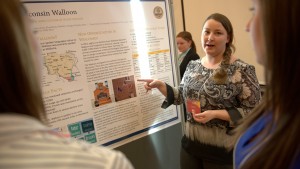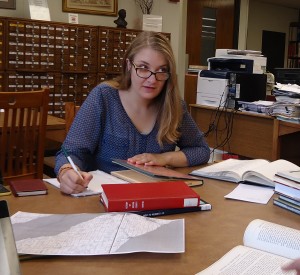
Senior economics major Kristina Hoyt co-presented the Walloon language research project poster at the 2015 CERCA event.
When UW-Eau Claire Blugolds graduate, many of them have bragging rights to some pretty impressive accomplishments. The university has seen Washington Post interns, international field researchers, Fulbright scholars and a recent Rhodes Scholar, to name a few. Now, three Blugold seniors set out to achieve a goal the campus has not yet seen — saving a language from extinction.
Dr. Kelly Biers, visiting assistant professor of French, and three UW-Eau Claire students are conducting research to preserve a dying language found in eastern Wisconsin: the Walloon language. Along with French, Flemish and Dutch, Walloon is a minority language spoken in Belgium, brought by Belgian immigrants in the mid-1800s to an area surrounding Brussels, Wisconsin, in the Door Peninsula.
The early research by Biers and his team shows that only around 30 speakers of Walloon remain. Seniors Madeline Tautges, Madison, Kristina Hoyt, Eau Claire, and Lizzy Ehrenberg, Rosemount, Minnesota, have been working with Biers for the past year on this evolving project. The research aims to preserve the eastern Wisconsin Walloon language by collecting audiovisual documentation of speakers and creating what the local version has lacked so far — a written format.
The project began when Biers, a sociolinguist, stumbled upon some information about Walloon immigration and later discovered that the Walloon language was still spoken in the area.
Throughout the world, as the population has become more mobile and commerce more global, individuals and groups have given up their native speech to adopt the dominant language of their region — a trend perpetuated for both social and economic reasons. For these same reasons, Wisconsin speakers of Walloon have slowly lost the language as the economic reasons and social opportunities to speak it have dwindled.
“I found that there was very little work done to study or preserve Walloon in this area, and almost nobody outside the community knows about it,” Biers said. “Since it is closely related to French, I saw an opportunity to work on a very meaningful project.”
Regarding the personal and societal impact of language extinction, Biers says, “Language is deeply tied to our identity, and the loss of any language is a major loss of history, culture and wisdom. Language preservation and documentation, however, requires an enormous amount of coordinated effort. I have been fortunate to collaborate with three highly motivated students and with support from the Student Research Collaboration Grants program offered through the university’s Office of Research and Sponsored Programs.”
Daniel Kaufman, director of the Endangered Language Alliance in New York City, addresses generational issues as he works to support speakers of more than 800 languages spoken in the city. He told New Yorker magazine in March 2015, “The older people are the only ones who can tell you what their youth stands to lose. The young are the only ones who can articulate the loss of an identity rooted in a mother tongue that has become foreign to them.”

Research team member Madeline Tautges is of Belgian descent, and has a personal interest in preserving the Walloon language spoken by her ancestors.
Research team member Madeline Tautges, an art major with a minor in French, has a horse in this race, so to speak. Her ancestors were from Belgium, coming to Wisconsin from the region of Wallonia. They spoke Walloon, so her connection to this project is personal.
“I grew up with little knowledge of what the word Walloon meant or that it was anything more than a nearly extinct dialect of French. I am now able to imagine how my ancestors lived, what they ate and the challenges they faced,” Tautges said. “The preservation of this language and culture, along with involvement from the younger generations, is a way for us to make sure this piece of history is not forgotten, even though those who experienced it firsthand are gone. Meeting members of the Walloon community and hearing their stories has made me feel closer to my own background as well as incredibly grateful to be a part of this project.”
The UW-Eau Claire research team has traveled to the Door County area several times to attend festivals, conduct interviews, collect audio recordings and develop the tactics necessary to help create a writing system. While there is a written version of Walloon in Belgium, it employs French spellings and accents, so the team is creating a version that substitutes more Americanized spellings of those sounds. One goal is to create materials for elementary-aged children to learn from, as well as written materials for the Peninsula Belgian-American Club, in which some remaining speakers are members. Throughout this process, the students have connected with members of the Walloon community and gained incomparable experience and opportunities to build skills in analysis, communication and presentation.
Like Tautges, Kristina Hoyt knows a bit about the needs for preservation of heritage, and has likened the loss of Walloon language and culture to the loss of her own heritage.
“In my own case I have lost the connection with my heritage, especially that of my Ojibwe and Cherokee ancestry, in favor of Euro-American assimilation,” Hoyt said.
“Without maintaining an understanding of a language, we lose a sort of cultural relevance to things like festivals, food, traditions, technology, medicine and holidays,” Hoyt said. “Over this century alone, hundreds of native languages have either become extinct or endangered, with more than 100 on track for extinction within the next few decades.”
According to Hoyt, an economics major with a minor in international business, this specific kind of research is important because language is essential to cultural heritage and cultural knowledge. But there are other reasons that society as a whole can benefit from preservation of culture and minority languages.
Hoyt explains that long-lost technologies and methods are being rediscovered for the first time in centuries, and many still baffle scientists and archeologists. Some examples are ancient Chinese medicine used to develop new drugs; glass techniques once used in medieval cathedrals installed as light filters in Mars rovers; and ancient geothermal heating and cooling technologies being used once again around the world for economic and ecological reasons.
“It’s just strange how we had all of this technology at one point, lost it due to conquest and poor documentation, and now it has taken centuries, if not millennia, to rediscover it or find an alternative,” Hoyt said.
In relating to the project at hand she says, “Instead of letting a culture die and forcing assimilation, maybe it’s just as important to make sure we can at least document it in case there is something more ‘useful’ than just preserving heritage. We never know when some traditional story or method could further advance our knowledge of science and technology. We just have to listen.”
Because the students involved are preparing to graduate, the team is currently planning for the long-term sustainability of the project. Plans for coordination with other universities and local heritage organizations are already underway, and the team will be looking into external grants to keep the project moving. Any students who are interested in joining the project should contact Dr. Biers at bierskd@uwec.edu.
